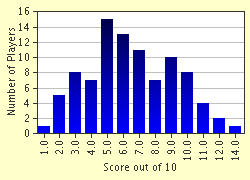Quiz Answer Key and Fun Facts
1. How many deputies to the European Parliament were there before the elections in 2004?
2. Where are the additional plenary sessions of the European Parliament held?
3. When did the first direct elections for the EP take place?
4. During which European Council was the seat of the EP officially established?
5. In which country is the voting in the elections for the European Parliament obligatory?
6. All Members of the European Parliament receive an identical salary.
7. What is the biggest party in the European Parliament called?
8. How many vice-presidents are there?
9. The EP is the co-legislator together with:
10. The EP has the right to vote the motion of censure against the European Commission.
Source: Author
beatka
This quiz was reviewed by FunTrivia editor
bloomsby before going online.
Any errors found in FunTrivia content are routinely corrected through our feedback system.

